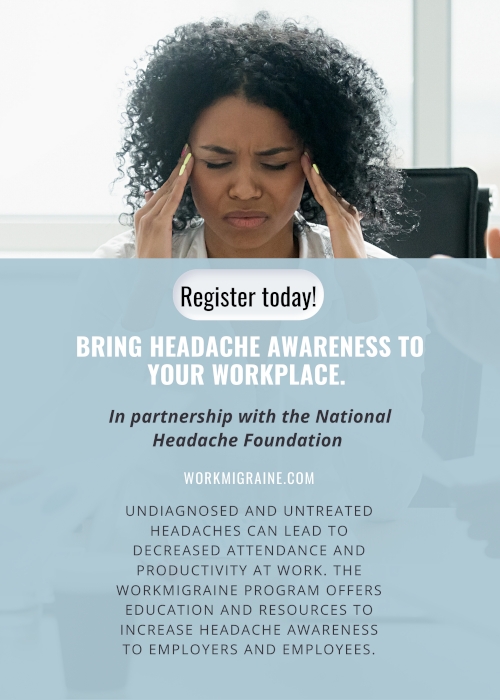Down with a Dream
Monday, October 7th, 2019
In October, we observe Down Syndrome Awareness Month. It’s a great time to celebrate all the wonderful things that people with Down Syndrome are doing around the world. Gabrielle Angelini is just one of those inspiring examples. She’s taken perceived limitations and proven that they are no match for a dream and determination. As a business owner and rising internet sensation, she’s spreading her message of hope and overcoming far and wide. We’re pleased to be sharing her story with you today.
A Hug In A Mug
Gabi’s road to success begins like most when everything looked bleakest. After graduating from high school, she was hard-pressed to find a company that would hire her. Perhaps the most important thing to communicate this month is dispelling myths surrounding those with Down Syndrome. Employers assumed that because Gabi was different, she may be slower and less able to perform on the job.
It turns out all of that rejection was just the fuel Gabi needed to make an even bigger impact, not just in her own life, but in the lives of others. If no one else would hire her, she would create her own company and provide jobs for others in her same position. Gabi is a great example of entrepreneurship at its finest! With the help of her mom Mary, they created Gabi’s Grounds Coffee Shop: A Hug in a Mug. When asked about her company’s slogan, Gabi explains with a smile, “A hug in a mug, because I’m a hugger.”

Get Gabi’s Off The Ground
Gabi’s Grounds was founded in 2017 with tee shirts, mugs and of course, coffee. You can find Gabi’s own special coffee blend at numerous major grocery chains like Lowes Foods and Harris Teeter. Even with all this success, Gabi’s dream isn’t complete. She wants to open her own brick and mortar storefront for the coffee shop. You can play a part in helping her do that!
On November 3, the “Get Gabi’s Off The Ground” fundraising event will be held at Plus Dueling Piano Bar in Raleigh. Tickets are available now at a special price of $35. They include dinner, live music and the chance to win some really special prizes like a trip to Disney as well as Myrtle Beach. If you’re not local to the Raleigh area, visit Gabi’s Grounds page on Facebook to stay up to date on Gabi’s adventures and other ways you can support her and her business.

Down With Love
In addition to Gabi’s business pursuits, she found love along the way with Nick. They met at a special needs conference and hit it off. While they keep up a long-distance relationship, their parents recently arranged a surprise reunion that went viral on the internet! Their sweet affection for one another is enough to bring a tear to even the driest eye.
Watch Gabi & Nick’s Surprise Reunion!
Now with over 3 million hits, the video is catapulting Nick and Gabi into the eye of the public, furthering their message of hope and overcoming. They have their own Facebook page too!
You Can Too!
Gabi’s ultimate message to others is that they can do it too. You can follow your dreams and achieve them if you keep on trying and never give up. Mary expresses something we all understand when she says that life is hard for all of us. But for those with special needs, it can be even more difficult. Gabi has had the opportunity to share at multiple special needs conferences and cheer her peers on! Mary has watched Gabi blossom over the last few years as her confidence has grown. In a recent interview for The List TV, Mary said this about her daughter, “She’s who she’s supposed to be and everybody deserves that chance.”

Why Are You Still Getting Cavities?
Monday, September 30th, 2019
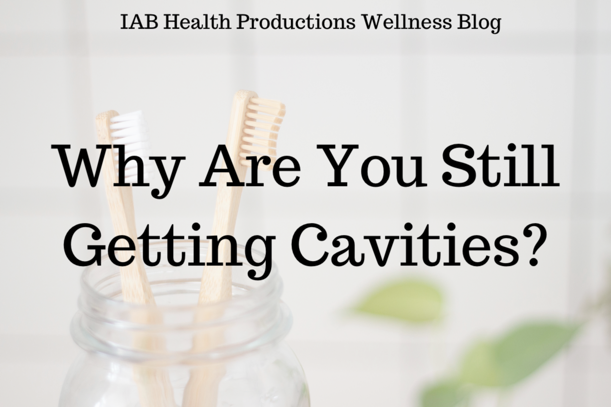
Most of us have grown up hearing that in order to avoid cavities we should brush and floss twice a day. People with exceptionally good oral hygiene may even opt to brush after meals as well. We’ve been told that the acid and bacteria in food is what breaks down the enamel in our teeth and leads to cavities. What if you do all that and you still get cavities? Do you just have bad teeth? Is your enamel weaker than normal? Maybe. But what if good oral hygiene just isn’t enough? Here are a few lesser-known tips to help you keep your teeth healthy and cavity-free!
Don’t Brush After Eating
Resist the urge to brush your teeth immediately after eating. This one may be surprising but it’s true. Every time we eat, especially acidic foods, our teeth come under “attack.” The enamel is weakest just after eating. It takes about thirty minutes to an hour for your teeth to recover from the acidic attack. Brushing just after eating can actually push the acid into your teeth, furthering the damage being done. Rinsing your mouth with water is recommended rather than brushing. If you must brush after eating, wait at least thirty minutes after your meal.

Eat Less Often
We’ve already mentioned that it can take up to an hour or more for your teeth to recover from eating. If you are prone to snacking or eating small meals throughout the day, your teeth are at increased risk for damage. Cavities are more likely to form since your teeth are being repeatedly accosted by bacteria and sugars. Even if you’re not addicted to sugary sweets and soda, pasta and other simple carbs can still turn to sugar on your teeth.
Eating three regular meals is recommended as opposed to eating more frequently throughout the day. This gives your teeth a chance to re-mineralize to withstand the next exposure to food. If you find you seem to get cavities more frequently than others, despite your good oral hygiene, you may need to adjust your eating habits.
Choose Hot over Iced

Do you drink coffee? Regardless of potential tooth staining, the temperature of your coffee may have an indirect effect on your propensity for developing cavities. We tend to drink hot coffee more quickly than iced coffee. This is obviously because we want to drink it while it’s hot before it cools down too much. Iced coffee or soda is something we may sip on for several hours. Since it takes us longer to drink, our teeth remain vulnerable over a longer period of time.
Can’t give up your iced coffee habits? Just be sure you’re not taking your time with it. Choosing a smaller drink size may help you finish more quickly and even cut down on your sugar intake. Follow up your coffee drinking with some ice-cold water to help rinse your teeth.
Use a Mouthwash with Fluoride
If you find you end up with cavities at every dental visit, you may be missing a key element in your hygiene routine: fluoride! In addition to fluoride toothpaste, check your mouthwash. Some mouthwashes are merely antiseptic, meant to kill bacteria that cause bad breath. Find a mouthwash that also includes cavity protection. These mouthwashes are infused with fluoride and will help fortify your enamel against caries.
Visit Your Dentist Regularly
It’s recommended that children begin seeing a dentist from the time their first tooth appears, and every six months after that. As adults, we can typically go for longer stretches of time between dental visits. However, if you’d had lots of tooth decay or other dental issues, you may need to schedule your visits more frequently. Dentists can identify areas of tooth decay that you may be unaware exist. If identified early enough, some tooth decay may be reversible before it becomes a cavity that needs filling.

Good dental health is essential to our overall health and well being. It even contributes to our self-confidence. A smile is often the first thing others see! We hope this article helps you keep yours looking bright and healthy! Visit our National Wellness Observance Calendar for more information on Dental Hygiene Month during the month of October.
Midwifery: Advocating for Healthy Birth
Wednesday, September 25th, 2019

Below you’ll find the personal story of Amanda Zopp, writer and social media manager for IAB Health Productions. Following her personal experience, we’ll include some additional information about midwifery.
Before I became pregnant, I always feared labor and delivery. I was confident that I would want ALL the drugs and even hoped I might be able to opt for a C-section. However, something changed when that little life was inside me. I started reading more about the birthing process, the impact drugs could have on my tiny infant and the journey of breastfeeding. I felt a little strange about the prospect of breastfeeding, but I was willing to push past that and the pain of childbirth if it was the very best thing for my baby.
After learning more and realizing my body was designed to birth a baby, I gained a new level of confidence and determination. I went the opposite route and decided, I wanted a natural, drug-free childbirth! I excitedly went to the OB-GYN at 6 weeks along for my first ultrasound.
Scheduling a C-section at 6 weeks Pregnant
When I got there, I began filling out my paper work, medical history etc. When the doctor came in to speak with me she began telling me that due to a pelvic surgery I’d had ten years prior, we would go ahead and schedule my c-section. I was distraught! That wasn’t what I wanted at all. I attempted to explain to her that my orthopedic surgeon had assured me I would have no trouble in childbirth. I had long since healed. I could run, jump, bend! I was very flexible and had even completed the Beach-body Insanity workout, known for its strenuous plyometric exercises. Her only response to me was a blank, “We’ll see.” But that we would go ahead and schedule the C-section. She told me she was concerned about the long-term effects of holding my legs in a position for childbirth over a long period of time. I knew when she said it that the doctor was likely more concerned about a potential lawsuit than any physical effects on me.
She left the room and holding back tears, I turned to my husband and said with determination, “We’re going somewhere else.” I’m so grateful that I knew enough even then to be own best advocate. Women should be in charge of the births they want to have, barring any high risk situation (which mine was not).
A Midwife: Support System and Advocate
I began looking into Midwives in my area and found two Certified Nurse Midwives that were part of a practice with other OB-GYNs. That put my mind at ease. I would be seen by everyone in the practice, but primarily by a midwife. At my first visit, I explained to her the previous doctor’s concerns. The midwife looked at me and matter of factly asked, “Can you squat? Get on your hands and knees? There’s more than one position to birth a baby. If your operating physician said you would be fine, that’s all that matters.” Instantly I felt relief. I was going to have her support to have the birth I wanted, with as little intervention as possible.
I’m happy to report that I have since given birth naturally, drug-free to two children. I’ve had no residual pain or impact on my old injury. I was also able to successfully breastfeed both children until a few months past a year old. Having the support of the midwives felt like a partnership. I had a say in how I wanted my births to go. That was important to me and so empowering. Birth is not an illness. It’s a natural process of life. Women have been birthing babies since the beginning of time. If they could do it then, we can certainly do it now. Explore your options. Find a provider who will listen and give you the best birthing experience possible. You deserve that.
~ Amanda

Both a Midwife and OB-GYN are Important
Both OB-GYNs and CNMs are able to provide prenatal, gynecological and primary care in addition to delivering babies. OB-GYN doctors are skilled and trained to handle any complications or issues that may arise. They are trained to intervene. If you’ve ever given birth or seen someone give birth, you know that the doctor who “delivers” the baby, oftentimes merely catches it. The mom is doing all the work!
Midwives are a great choice for any normal pregnancy and delivery. They typically place more emphasis on a woman’s own physiology and ability in childbirth. They seek to avoid and decrease unnecessary intervention. Ninety-four percent of deliveries by Midwife takes place in the hospital. In situations of high risk or medical emergency, OB-GYN’s are the most qualified. Midwives are able to work in partnership with doctors to provide the safest and best experience for the mother, baby, and family.
National Midwifery Week
The American College of Nurse-Midwives has created National Midwifery week, observed September 29th – October 5th, 2019. This week is designed to celebrate and show appreciation for our midwives. We can also use this week to share our stories, spread awareness and promote healthy birth across the nation. Visit our Wellness Observance Calendar for more information.
Mental Health & Suicide Prevention
Tuesday, September 10th, 2019

The assault on our mental health is a daily battle we each face. Some of us fare worse than others. It’s important to understand how to cultivate good mental health. When we keep our minds healthy, we help prevent suicide. We must also be aware of the struggle in others. Mental struggles are all but invisible. It takes intentional effort to know each other well enough to sense when something isn’t right. We must express care and concern about the internal struggles of our loved ones. As a community, we must encourage and lift each other up.
Good Mental Health Habits
- Get Enough Sleep
- When we don’t get enough rest, our minds can become unhinged. Irritability, moodiness and depression set in. Read more about the correlation between sleep and mental health in an article from the Harvard Medical School website.
- Eat a healthy diet.
- Nutrition has a major effect on our energy levels and overall mental wellness. Certain foods can make us feel sluggish and glum. Other foods can actually brighten our mood and give us energy.
- Exercise
- Exercise has to be one of the single most effective tools for our mental health. Getting your heart rate up releases those feel-good endorphins that keep us upbeat and positive. Start your day with a good sweat session and you’ll feel ready to take on the world.
- Socialize
- Yes, even for introverts, socialization is important. When we keep to ourselves, we’re alone with our thoughts and create even more isolation. It’s easy to feel alone, even in a crowded room. But when we engage in real conversation with others, it broadens our perspective. When we share in each other’s struggles and victories, we are operating in a community with one another. It is in sharing our lives with each other that we begin to understand how we are all truly more alike than we are different.

- Don’t Be a “Yes Man”
- Know what healthy boundaries you need to keep in place for your mental health. Try not to wait until you’re at the end of your rope to take a break. It’s important to rest, to be alone with your thoughts and process. Some people keep so busy that they never really know how they’re feeling until they’re too far down the wrong path. You can do anything, but you can’t do everything. Knowing when to say no is an important thing to learn.
- Put Your Phone Down
- Our phones never leave our side. Hours can go by with you just scrolling through other people’s lives. There’s a constant barrage of information coming at your brain and the stimulation can be mentally exhausting. We are more connected by social media than ever before, yet most of us are realizing just how shallow and isolating that connection tends to be. Make sure you put your phone down once in a while and talk to a human face to face. Turn your phone off and put it in a drawer for an hour or two and feel the freedom of not checking it every few seconds.
- Get Outside
- There’s something very grounding and clarifying about being in the outdoors. Going for a quiet walk around the neighborhood or watching the sunset can do wonders for your mental well being. Don’t underestimate the simplicity of getting more oxygen to your body by being outside. Observing how nature is functioning around you is a great reminder that the world is bigger than you and that everything will be all right.

Signs of Poor Mental Health
- Isolation
- Staying in a never going out. Insisting that you have too much to do when really you just can’t bear to be around others. You may even hold the belief that you’re the only one who knows what you feel like. No one else has felt the way you do. No one will ever understand.
- Depression
- When depression sinks in, every day it’s a struggle just to function. Getting out of bed is a huge accomplishment. Sadness or general indifference permeates every single day.
- Comparison
- Constant comparison with others can make us feel lacking in every area. Even though we know that what we see on TV, movies, or even on social media is curated to look a certain way. We are never seeing the full story. Yet mentally we may begin to feel as though we can never measure up. When we start to compare we become focused on what we lack, instead of what we have. We find our relationships, homes, clothing, finances, all come up short when compared to what we see.
- Hopelessness
- Feeling as though things will never get better, that we’ve screwed up too much or missed our chance perpetuates feelings of hopelessness. The truth is that there is always hope. But when you are caught in a cycle of hopelessness, that can be difficult to believe.
Poor mental health can easily lead to a thought process that may end in suicide. If you have thought about ending your life or believe the world would be better without you, please reach out to someone. Let them prove you wrong. Come up with a safe action plan to protect you from those dark thoughts. You are important and valuable and we need you here.
How Can We Help?
If you or someone you know is showing signs of poor mental health, here are some steps to take. Being equipped with the right expectations and resources for our mental health and the mental health of others is a starting point for winning the fight against Suicide.

- Be Bold. Ask Pointed Questions.
- Don’t be afraid to be awkward or embarrass yourself by asking someone if they’re planning to commit suicide. Their life may depend on your boldness. Isn’t that worth more than what someone may think of you? Ask exploratory questions: Have they made a plan to do it? Do they have access to the resources they need? Let them know you are coming to help them or encourage them to go to someone they feel safe with.
- Talk About It.
- Share your stories. Not everyone has the signature signs and symptoms. Sharing the stories of loved ones you’ve lost to suicide or how you overcame an attempt on your own life can potentially save the life of someone else.
- Be present and aware.
- Don’t let people slip through the cracks. Learn people’s names and let them know they’re valued by you. You never know what a smile or kind word may do in the life of someone else. It could mean the world to someone starved for love and attention.
- Be others-focused.
- We all have our own issues we are working through. When we focus on our problems, they tend to grow. When we look outside ourselves to the needs of others, we not only help them. We help ourselves in the process. If each of us focused on the well being of the person next to us, we’d all be taken care of. It has to start somewhere. Why not with you?
- Forgive Yourself.
- If it’s too late for someone you love, know that you’re not at fault. You can do everything “right” and still lose someone. Give their life more meaning by sharing their stories and helping someone else. Be kind to yourself and honor their memory.
For further information or assistance visit our wellness observance page or call 1-800-273-8255 to talk to someone any time of day. An online chat is also available to you right now.
How to Age Gracefully
Friday, September 6th, 2019

Age is just a number, they tell us. But it seems we’re getting older, younger and younger. Some twenty-somethings feel as though they’re pushing sixty. How do we keep our minds and bodies in tip-top shape as we age? Are the aches, pains and ailments just inevitable? Let’s discuss how to age gracefully. Hopefully, you’ll find a new lease on life in the paragraphs that follow.
Eat A Balanced Diet
This first tip is a simple one. It’s used so frequently, it may seem trite. But the simplicity and importance of eating a balanced diet cannot be overestimated. With all the fad diets and extreme restrictions out there, balance can be hard to come by. The fads will come and go. There is no one food group that can be termed “bad.” Most everything has a benefit in moderation.

Don’t deprive yourself of good foods that you like to eat. Just eat more fruits, veggies, lean meats and whole grains. Even carbohydrates are important. It can be tempting for weight loss to eliminate carbs almost entirely. Just like carbs are important, many healthy fats are rich in Omega vitamins essential for good heart and brain health.
Some people do have to monitor carbs more closely for other health concerns. But an extreme diet can deprive your body of nutrients it actually needs. While you may experience weight loss in the short term, what’s most important? Losing weight quickly, right now? Or sustaining a healthy, balanced diet over time that will lead to a healthy weight in addition to a long healthy life.
Move Your Body

Studies have shown that older adults who maintain active, healthy lifestyles, are 60% less likely to develop dementia. The way you treat your body affects your mind, just as the way you treat your mind affects your body. The mind-body connection is a powerful thing.
Think Youthful Thoughts
Our mental health contributes much more to our overall health than you might think. There are many who are dead long before their bodies are buried. Don’t be one of them! Live your life to the fullest. Make plans, set new goals, dream new dreams. As long as you have breath you have a purpose to fulfill. Meditation or Prayer has even shown to improve age-related memory loss. Meditation can contribute to your physical and emotional health by decreasing stress and improving mental clarity.

Invest in our youth! Mentor someone younger than you. Volunteer with after school programs or be a big brother/sister. Being around young people keeps you dialed in and aware. We tend to be most like the people we spend time around. Keeping our associations varied opens our minds to learning new things. Learning new things keeps our minds healthy.
Sharpen and challenge your mind to think. When you cease to learn, you cease to truly live. Take up a new hobby or audit a college course. An endless supply of knowledge can be found simply by taking up the habit of reading. When you continue to utilize your thinker, you guard yourself against dementia and strengthen your mind.
Wear Your Sunscreen
Never underestimate the impact of a good skincare routine, both for men and women. Begin your preventative care as young as age 25. The damage done to our skin only shows up about ten years after it occurs. Be diligent in your skincare routine and you will see a marked difference in your youthful appearance.

For women, it’s important to use a cleanser, toner, eye cream, treatment product (anti-wrinkle or brightener) moisturizer, and exfoliate regularly. Men tend to exfoliate and moisturize the lower portion of their face through shaving. They show their age on their forehead and around their eyes. Daily sunscreen in addition to an equally good skincare routine is just as important for men.
Own it!
A Killer Among Us: Opioid Addiction
Thursday, August 29th, 2019
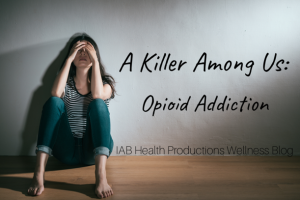
We’ve seen a startling 95 percent increase of drug overdose induced fatalities in the last 10 years. Deaths caused by opioids (oxycodone, hydrocodone, codeine, morphine, etc.) account for two-thirds of that number. Many patients are ignorant of the dangers of opioids because they’ve been legally prescribed by a doctor. The danger seems less because the drugs are not illegal. However, we’ve clearly seen just how dangerous they can become.
Our best line of defense is to intervene before addiction begins. But we must also have a course of action to aid those who have already been taken over by addiction.
How Does Addiction Start?
It’s easy to think it won’t happen to you. Maybe you’re aware of the dangers and risks, but you know you’re not “that type of person.” It’s important to know that NO ONE is immune from developing a drug addiction. The likelihood of opioid addiction increases after a mere 5 days on the medication. It’s recommended that prescribed opioid use last no longer than 3 days, at the very lowest dose possible.

Addiction begins as a pleasurable experience. The drugs block pain receptors and increase endorphins, creating good feelings that you want to continue – especially when it wears off and the pain returns. As drug use continues, the body’s production of endorphins slows down, creating a “tolerance” of the drug. This tolerance means you need more of the drug to get those same feel-good feelings. Continually increasing the dosage of the drug to achieve the desired “euphoria” is what can lead to overdose.
What starts as a pleasurable experience becomes a controlling force. You no longer have a choice in the matter and your body takes over. An insatiable need for the drug becomes greater than any knowledge of the dangers involved. This is how families are torn apart and lives ruined by the epidemic of drug addiction.
How Do We End Addiction?
The simplest way to end addiction is before it starts. Lessening the number of opioids prescribed is an obvious way to keep them out of people’s hands and off the illegal markets. Taking the extra time to educate patients about proper use and disposal is imperative. Monitoring patients who have prescribed opioids for pain management is also important. There are certain indicators that reveal a greater risk for addiction, but we have to keep in mind that ultimately anyone could be at risk.

For those who are already suffering from addiction, we must provide assistance. Help is available in the form of addiction lessening medications and rehabilitation centers. We have to keep the conversation going, end the stigmas attached to drug addiction and extend a hand of hope to those who are suffering in silence.
Rehab Is Not Enough
The tragedy for those affected by addiction begins long before a life ends. Families suffer through with their loved ones, helping them through rehab, watching them suffer through withdrawal, and seeing them go back to the addiction that caused it all. One of the most common causes of overdose-related deaths occurs to people who’ve completed rehab programs. They’ve gotten clean, but try to go back to the same level of drug they were taking before. Their bodies no longer have a built-up tolerance to that concentration of drug and they die instantly from an overdose.
Rehab Centers alone are not enough. Those struggling to overcome an addiction, even after rehab, need hope. Hope for a better life, for relief from the pain, the mental battles they face, a life after addiction that can only come from the proper input. We have to stop fighting old habits and start building new ones. It’s the only way to create lasting change.
Centers like Mercy Multiplied offer a place of restoration and a bright future for women from all walks of life. They help young women struggling with addictions, victims of abuse, prostitution, unplanned pregnancy and more. They equip these women to begin again and give them the tools to prosper and flourish – all free of charge. If you know someone who needs help and thinks Mercy might be the right fit, please reach out before it’s too late. Every life is valuable. We’re losing over a hundred lives to opioid addiction every single day. We need you here. We need your story of overcoming to help those who think they can’t.
Kristy’s KleanUp is dedicated to the memory of Kristy Lee Farnham (the daughter of IAB Health Productions’ owner) who lost her life and her unborn child’s life, battling opioid addiction. Kristy was an advocate for the environment. She kept journals of her life goals and one of her major goals were being involved in a cleanup group for local parks and the community. We honor Kristy’s life by organizing Kristy’s KleanUp this year for her birthday (September 13th) and will continue to remember her every year by making Kristy’s KleanUp an annual event.
Understanding Immunization: Answering Common Questions
Wednesday, August 21st, 2019
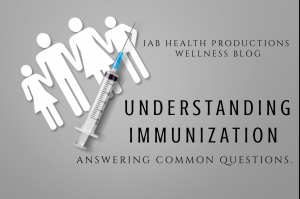
The vast majority of Americans dutifully receive their recommended vaccinations on schedule. But some people have expressed concern about the safety and even necessity of these injections. Just as we are watchful about the food we put into our bodies, many of us are vigilant about medicines as well, opting for a more natural route when possible. The key phrase is when possible. There are times when only medication will do the job.
While its perfectly understandable to have questions and concerns about such powerful vaccines, it’s also important to have the most accurate information. Our goal is to bring you the most objective, researched information available on the subject of immunizations.
Vaccine vs. Immunization
Are these words interchangeable? Many times we hear those with concerns use the term “vaccine”, while healthcare professionals opt for the term “immunization.”
The vaccine is the actual injection of medicine, while the immunization is what occurs in your body as a result of the vaccination. We can assume medical professionals are focused on the overall goal of the injection, hence the general use of the latter term.
Are They Safe?
The most likely objection to receiving an immunization is a hesitancy about safety. As young parents with a new baby, it can be overwhelming wading through the information overload about vaccines. The CDC website is the most comprehensive place we have found for thorough, accurate information regarding the safety, ingredients, and potential side effects as well as the recommended schedule.

In addition to CDC, there is a third party organization completely separate from the government. The Health and Medicine Division (HMD) of the National Academies of Science, Engineering and Medicine is an independent, nonprofit organization. Their role is to be an unbiased source comprised of scientists who can attest to the safety or danger of particular vaccines. Read their study on some of the major vaccines that have created some concern for potential side effects. An easier to read the summary of the report’s findings can be found here. Knowing that a third party is involved to keep the public informed is very reassuring.
While the overall goal is to ensure a healthy society and eradicate diseases, a parent wants to know that their particular child will not undergo undue risk for the sake of a greater good. The CDC reassures us that the vaccines administered today are the safest they’ve ever been and are continually monitored for their safety. The truth is that with any medication, there will always be some risk of side effects. But the benefit of vaccines is believed to outweigh any potential risks.
Are Vaccines Really Still Necessary?
Our bodies are complex organisms that highly trained and skillful scientists have studied intently. The immune system specifically is extremely fascinating and intelligent. Vaccines are designed in such a way that a weakened germ or virus is injected in order that our bodies can produce “memory cells” capable of warding off any future contact with that particular illness. This creates a kind of immunity against infectious diseases.
With so many people immunized against these diseases, it only follows that they would gradually cease to occur at all. It can be easy to forget the severity of these diseases and the lives lost to them when we no longer see them in our society. Many of us have said, “Well, I had chickenpox, measles, mumps, etc. It wasn’t so bad! I was fine!” However, complications can arise from these diseases. Most of which may affect the very young, elderly or those with a weakened immune system. In these cases, eradicating the occurrence of the disease by lessening those carrying the contagions, we protect those in our community for whom these diseases could be deadly.
Why Spread Awareness?

Some people simply have a lack of awareness about their recommended vaccines. If you are a generally healthy person, you may forget to schedule a regular check-up with your Primary Care Physician. Perhaps you have a busy schedule (as so many of us do). Scheduling a time to receive a vaccine seems to rank much lower on our priority list than countless other more urgent things.
As employers, we can remedy this issue by offering Td and Flu vaccines at work. Posting recommended vaccines schedules, reminders and information in the workplace is another great way to raise awareness. Click here for a complete list of recommended vaccines for every age.
Download our free Wellness Observance Calendar for resources on promoting Immunization Awareness, as well as other health-related issues. Join us as we seek to promote Workplace Wellness and increase the health of our Nation.
Health for the Homeless
Tuesday, August 13th, 2019

It’s estimated that over half a million people in the United States are homeless. While individuals and groups such as the National Alliance to End Homelessness are working to decrease that number, these people are in dire need of good healthcare. With exposure to the elements, poor nutrition, poor sleep etc, people who are homeless are at high risk for chronic diseases and behavioral conditions. While it seems there is someone on every corner of major cities holding a sign begging for help, a few dollars in their pocket just isn’t enough. Our National Healthcare Centers are doing what they can to bring health to the homeless.
Services Provided
Health Care centers across the nation provide quality healthcare to lower income Americans. The National Health Care for the Homeless Council provides funding specifically for those most vulnerable – the homeless community. In the course of a year, health centers were able to provide care for over 1 million Americans experiencing homelessness.
In addition to primary care, they provide behavioral health, chronic disease management, dental care, laboratory services and other specialty health care. They have even provided transportation, translation and social services. The NHCH seeks to provide health care as well as be an advocate for the homeless.
Health care providers are trained in trauma care, offering individuals dignity and respect. They know their situation best and each person’s experiences have been different. The homeless are often overlooked or carelessly grouped together. Each one once had a life just like anyone of us. They are someone’s daughter, son, mother, father, friend. Some risked their lives in our armed forces, others once had status and wealth. At our local health care centers, the goal is to treat them with the same importance as anyone else, since they possess that inherent value as human beings. The NHCH believes that housing and healthcare are basic human rights and they are fighting to provide that.

What Can We Do to Help?
By supporting policies improving conditions for the homeless you can affect lasting change that will go beyond a twenty-dollar bill on any given day. Visit the National Health Care for the Homeless website to find out how you can partner with them. Outside of contributing to the cause both financially and in policy, many health centers utilize volunteers. Find out if you can volunteer at your local health center or homeless shelter.
Spread awareness! On August 15, 2019, we will observe Healthcare for the Homeless Day. Take a look at our National Wellness Observance Calendar for more information and how to get involved.
Kindness goes a long way. It’s easy to judge what we don’t understand but actually makes very little sense for us to do. Shake a hand. Learn their names and call them by it. Make eye contact and share a smile. The day we lose compassion for those less fortunate than us is the day we truly lose ourselves.

The Working Mom’s Guide to Breastfeeding
Monday, August 5th, 2019
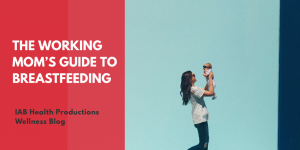
So you just had a baby! Congratulations! You’ve made the decision whether out of desire or necessity (or both!), to return to your job after maternity leave…AND you’re breastfeeding. Well, you should know, breastfeeding while going back to work has its challenges. But it is very possible if you’re prepared with the right knowledge and expectations. In honor of World Breastfeeding Week (August 1-7), we want to share some tips to help you keep a healthy supply and continue your breastfeeding journey for as long as you’d like.
Balance – Banish the Guilt!
It seems unfair to be forced to choose between what’s best for your baby and what’s best for your career or finances. We want to help you feel like that’s not a choice you have to make! While keeping up with work and doing just as great a job as always is important, your health and the overall health of your baby should never be what suffers.

You’ve now entered into a new role of motherhood which requires self-sacrifice, multi-tasking, and the constant awareness that part of your heart now exists outside of your body. Be prepared to give yourself lots of extra grace and take the pressure off of yourself. It may take some time to get back to the level of productivity you once had. The commitment to pumping while at work is a significant one. Commitment is what it takes to make it happen! Give yourself a goal to reach. Maybe you want to try it until your baby is 3 months old, six months, or go for the full year! Take it a little at a time, embrace the quiet moments and extra breaks that pumping at work allows for you. If other people can take smoke breaks every couple of hours, you can take that time guilt-free to produce nourishment for your new baby.
Invest in Quality Equipment
Who says your productivity has to slow down, just because you have to pump? Technology has advanced so much in recent years. It’s possible to pump completely hands free while on your commute or even at your desk while responding to emails. It’s your world, mama, make it work for you! Many insurance companies will even provide a quality pump at no extra expense. Make sure to research all your options and find out what’s worked best for other working moms you know.
Keep Up Your Supply
One of the biggest challenges, outside of frequent pumping, can be keeping up a good supply. Being physically away from your baby for extended periods of time can signal your body to slow down its production of milk. Here are some ways to guard against that and keep up a supply to meet your baby’s ever-changing demands.
- Get enough rest
- It’s so important that in order for our bodies to perform at their optimum capacity, they have the rest they need to recuperate and repair. Give yourself a regular, soothing bedtime routine and stick to it. Just like your infant needs that time, so do you. It may not always be feasible, but it should be the goal. Three out of five days a week is better than none at all. Take a small snooze at your desk or in the car on your lunch break. Even if all you do is close your eyes and meditate for 10 minutes, it allows your brain and body a chance to rest.
- Eat a healthy diet
- Now is not the time to cut calories or skip breakfast. Your body NEEDS food for fuel to produce the proper nutrition for your baby as well as for you. You’re still eating for two and may find yourself even more ravenous than you were during pregnancy. Keep nutritious snacks full of fiber and protein close at hand at all times. Eat small meals every couple of hours and never skip a meal. Planning ahead is key, especially for your busiest days.
- Stay Hydrated
- If you’ve already begun to breastfeed you know how incredibly parched you become when you sit down to feed your baby. Keep a large, insulated water bottle with you at all times. Don’t like the taste of water? Try an infused water recipe or other added flavor packets (best to do ones without any added sugar). Staying hydrated is one of the MOST important aspects of keeping up a healthy milk supply.
- Keep photos of your baby close
- It can be difficult for your milk to let down when your baby is not close by. Keeping photos of your child around you, especially when pumping, can help keep your mind and therefore your body on the task it still needs to perform. Imagining your baby in your arms can also aid in your production of milk. Imagination is powerful. Use it to your advantage!
- Good communication with Caregiver
- Set up an arrangement with your child’s caregiver to communicate with you when your child feeds and how much they consume in one feeding. Aim to make sure that you are pumping at approximately those same times and replenishing the same amount in your pumping sessions. You may need an additional pumping to make up for the full amount you baby needs since a baby is always more efficient at extracting milk than a pump. Use your own best judgment.
- RELAX
- Take a deep breath. Let it out slowly. You’ve got this. Many moms have done it before you and they faced similar struggles. You’re doing a great job. Set the stress aside. Listen to some calming music or chat with a coworker who may understand your current season of life. Any way to alleviate some stress will help your body perform at its best. On the other hand, stress and elevated levels of cortisol produced by stress can create a whole world of health issues. If you find that the pressure to succeed at breastfeeding while going back to work is just too much, it is totally okay to stop. Do what you find works best for YOU.

Adjust Your Baby’s Schedule
There are lots of babies who may wake up at 8 am for the day and are back in bed for the night by 8 pm. If you work from 8 am – 5 pm or have a long commute, you may not see your baby much at all during the day. That can be emotionally difficult as well as taking a toll on your supply and breastfeeding relationship. Take measures to slowly adjust your baby’s schedule. Perhaps you can shift it a little later so that you have more hours together in the evenings before bedtime.
Night wakings can be especially difficult for a mom who works outside the home. Not only are you getting less sleep from waking up to feed your baby, but you also really crave that time to hold, feed and bond with your baby. It feels like you must choose between your basic need for sleep and the instinctive desire to love and care for your child. Consider safe options for co-sleeping (baby beds that attach to the side of your bed are a great option!). Studies have found increasing benefits for better sleep and attachment between parents and children who co-sleep. Even with decreased time together during the day, those night-time feeds can do wonders for your milk supply and the bond with your baby.
Keep the Proper Perspective
It’s so important to keep things in the proper perspective during this time. As a mom, you’ll have plenty of opportunities to feel like your failure or success as a mom rides on this one thing. The reality is that your baby needs to be fed, whatever that may look like. Your desire to do what you feel is best for your child is admirable and praiseworthy. It’s what makes you a great mom!
Taking care of yourself also makes you a great mom. The breastfeeding relationship should always be mutually beneficial. When it stops being beneficial to one of you, (typically that happens for mom first, unless the supply has dipped too low) it may be time to reevaluate your options.
Stay in open and honest communication with your own personal “village”: your spouse, pediatrician, lactation consultant, mom, other seasoned mom friends. Lean on your support system and let them help you. Never forget that your experience is yours. It doesn’t have to look like someone else’s to be good. Keep going and hang in there! These days go by just as quickly as they say they do.



